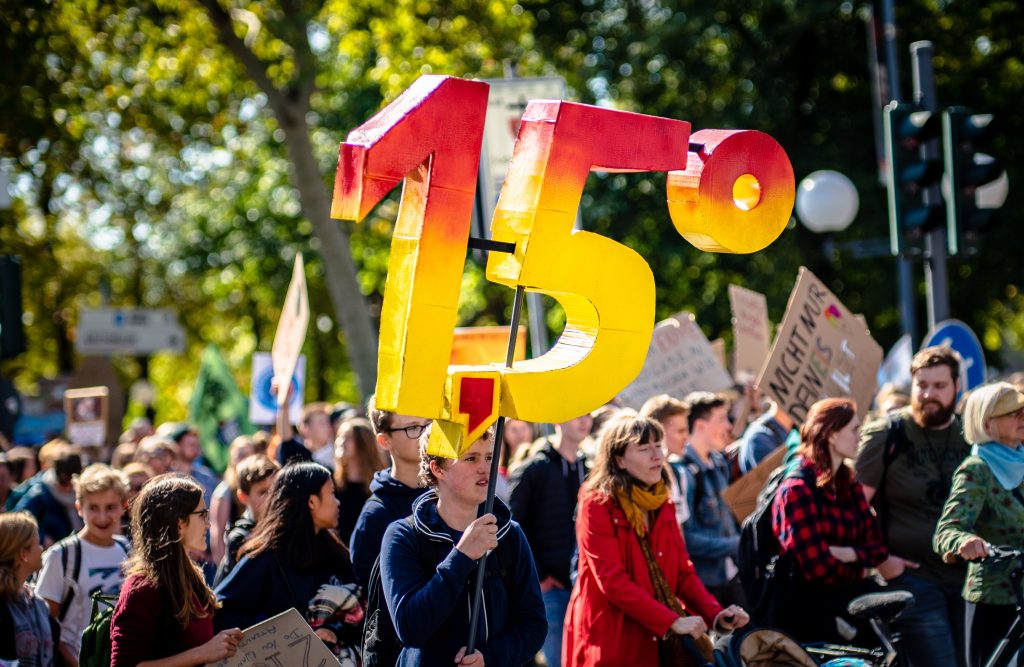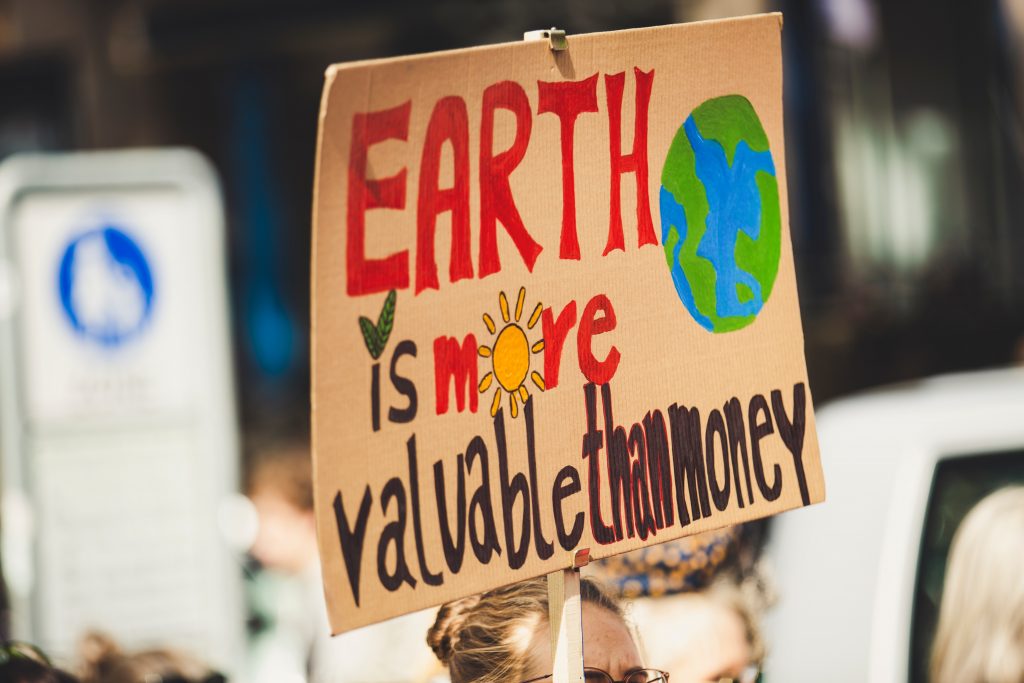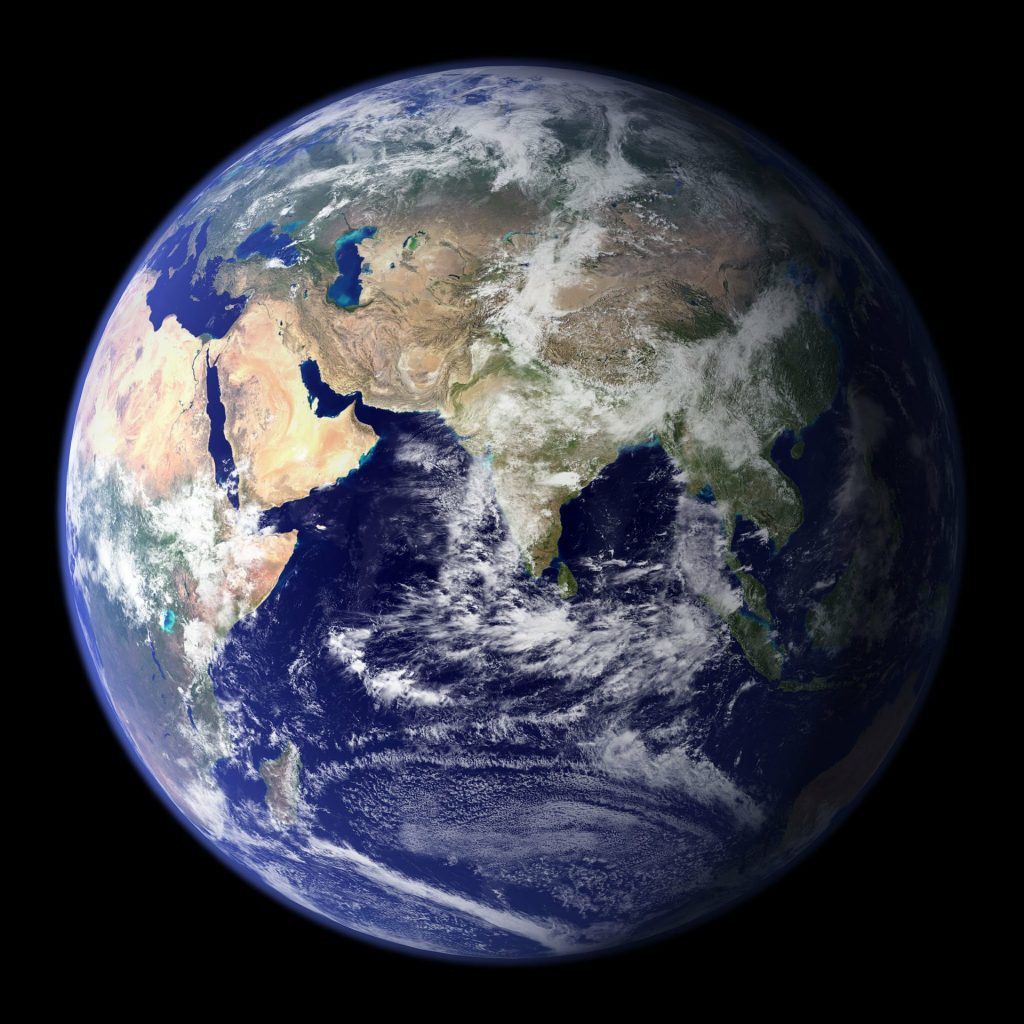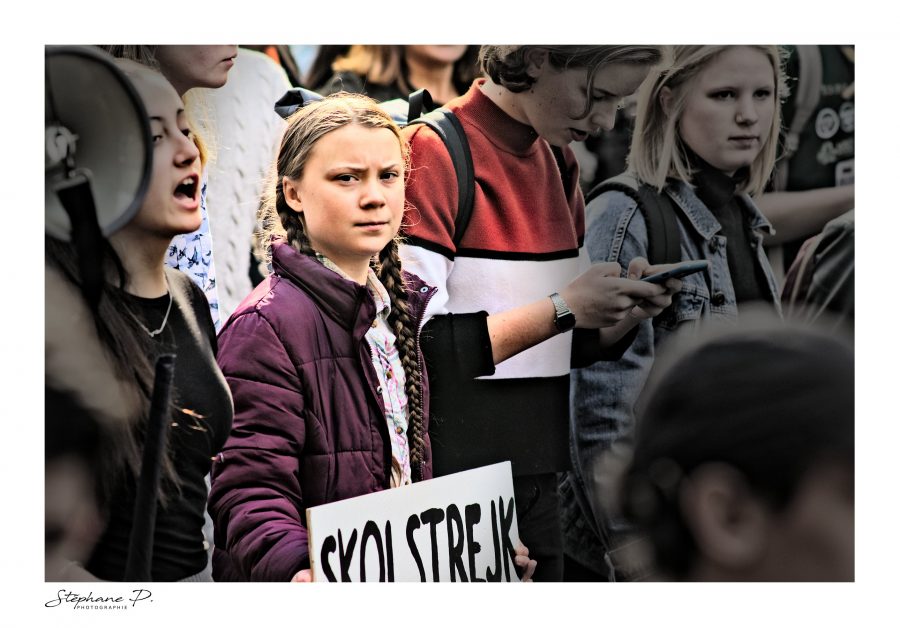From New York to Mumbai, climate protesters flooded the streets in cities around the globe, marching out of their schools, homes and workplaces to demand action on climate change https://t.co/lpTJjCsjKr pic.twitter.com/C2qQoP9IvG
— CNN (@CNN) 20. September 2019
In Australia, Asia, Europe, Africa, North and South America and even in Antarctica, the world is waking up to the realities of climate change in a wave of protests. On Friday, September 20th, it is estimated that over 4 million people went on strike in 185 countries. There were 6000 events in 1000 cities to demand climate justice [*1] [*2].
Just over one year ago, the teen climate activist Greta Thunberg started protesting in front of the Swedish parliament building to raise awareness for climate change. Her single protest has inspired the biggest climate protest in world history [*1].
These waves of hope are determined to cool the waves of fire spreading around the globe because of irresponsible human actions. “Our house is on fire,” Thunberg alerted the world in a speech on Friday, January 25, 2018 at the World Economic Forum in Davos [*3] [*4]. Our house is on fire. What would you do if your house was on fire?
The images and videos of the protests are overwhelming. Human beings flood the streets in unity. They unite across generations and across nations. Children, adults, and the elderly from Delhi, Sydney, Tarawa, Nairobi, Johannesburg, London, Prague, Mexico City, Istanbul, Lahore, Seoul, Berlin, Amsterdam, and Jakarta have gathered on the streets. The list goes on and on [*2] [*5]. People march, lead, chant, sing, shout, and demand their right for a safe future. Each person is a drop in a sea of protest that draws our attention to a world-wide emergency. Climate change is happening and it threatens our very existence on earth.
The Fridays for Future movement started with one person. When Greta Thunberg was eight years old, she first heard of climate change and wondered why no substantial actions were being taken to tackle the crisis. When she was 11, her worries about the climate crisis caused her to become ill. She fell into depression; she stopped talking; she stopped eating. When school started in August 2018, she decided to take action. Inspired by student activists from Marjorie Stoneman Douglas High School in Parkland, Florida, who had gone on strike to protest lax gun laws in the United States, Greta sat down on the ground in front of the Swedish parliament to draw attention to the climate crisis after heat waves and wildfires in Sweden. She decided not to attend school until the Swedish general elections on September 9. Greta demanded that the Swedish parliament reduces carbon emissions as determined in the Paris Agreement. Every day during school hours, Thunberg sat in front of the Riksdag with a poster that read “Skolstrejk för klimatet,” which means “School strike for the climate.” On September 7, she announced that she will continue to strike every Friday until Sweden aligns with the Paris Agreement. Her slogan “Fridays For Future” gained worldwide attention, and since November 2018, students and their allies from all over the world have joined her and demonstrated weekly [*3] [*6] [*7].
Probably the single largest demonstration in World History. Across the globe, millions join biggest climate protest ever. Cannot be ignored. Can be a tipping point https://t.co/DZ0Sx2eyJq
— Johan Rockström (@jrockstrom) 21. September 2019
Last Friday, September 20, in New York City, Greta Thunberg led a climate strike with over 250,000 participants [*8]. When she spoke at a rally in Battery Park, her message was clear:
This Monday, world leaders are going to be gathered here in New York City for the United Nations climate action summit. The eyes of the world will be on them. They have a chance to prove that they, too, are united behind the science. They have a chance to take leadership, to prove they actually hear us. Do you think they hear us? [approval] We will make them hear us! [approval even louder]
We have not taken to the streets, sacrificing our education for the adults and politicians to take selfies with us and tell us that they „really, really admire what we do.“ We are doing this to wake the leaders up. We are doing this to get them to act. We deserve a safe future. And we demand a safe future. Is that really too much to ask?
We are not just some young people skipping school or some adults who are not going to work. We are a wave of change.
Together and united, we are unstoppable. We will rise to the challenge. We will hold those who are the most responsible for the crisis accountable and we will make the world leaders act. We can and we will.
And if you belong to that small group of people who feel threatened by us, then we have some very bad news for you: Because this is only the beginning [*9].
In her speech, Thunberg reminds world leaders about the pressing responsibility to take substantial action. The International Climate Action Summit cannot be a gathering to make empty promises or delay necessary measures. Thunberg emphasizes that the world is watching and reminds politicians of their most basic duty: to lead well. She demands politicians to listen to their constituents, even those that are too young to vote, and to make decisions based on their well-being. As simple as this premise sounds, the Fridays for Future (FFF) movement demonstrates that citizens have to repeatedly and loudly call world leaders out on their irresponsible, destructive policies.
What is it that the FFF movement calls the politicians to do? In several speeches at the United Nations Climate Change Conference, or COP24, Greta challenged politicians to keep their commitment to the Paris agreement in order to prevent catastrophic consequences of the climate crisis [*3]. Changes in climate could cause freshwater shortages, changes in food production conditions, and deaths from floods, storms, heat waves and droughts. Furthermore, up to one million plant and animal species face extinction because of human activities [*10]. The World Health Organization has warned that the health of millions could be endangered by increasing malaria, water-borne disease, and malnutrition. As more CO2 is released into the atmosphere, oceans absorb more CO2 which makes them acidic. The acidification threatens the survival of the world’s coral reefs [*11]. The coral reefs sustain a quarter of the world’s fish species, therefore the loss would be tremendous. Barrier Reefs can take up to 100.000 – 30.000.000 years to grow. Over two years, 2016 and 2017, half of the Great Barrier Reef is estimated to have been killed due to a heat wave and bleaching event. [*12] [*13] [*14]

To limit these catastrophic outcomes, Greta repeatedly stresses two essential goals from the agreement: first, to prevent a 1.5 degree global temperature rise by stopping the emission of greenhouse gases, and, secondly, to secure equity on a global scale by mandating that affluent countries get to zero carbon emissions within 6-12 years so that poor countries will be able to build basic infrastructure, like hospitals, and provide electricity and clean drinking water to their people. Besides that, she warns how extreme dangers will also come from feedback loops and tipping points. A Feedback loops is how the output of a system affects itself. An example of a feedback loop is melting sea ice. Ice is more efficient in reflecting heat back into the atmosphere than bare land or water. However, because of an increase in temperature, Arctic sea ice is melting more during the Summer months, releasing water which increases the probability that more ice will melt next summer. The increase in sea level is extremely dangerous since hundreds of millions of people live in coastal areas.
The phrase “tipping points” describes how the earth’s climate can abruptly shift between relatively stable states. The consequences of these shifts may be irreversible. If permafrost melts, for example, massive amounts of methane gas are released. This accelerates global warming. Another risk is that a longer dry season could lead to a rapid die-off of the Amazon rainforest [*15][*16].
Despite all these dangers, the nations that lead the world in pollution rates like the US, Saudi Arabia, Turkey and other countries still far exceed the emission limits set by the Paris Agreement. Only very few countries like Morocco, Gambia and India, are taking the necessary measures in order to remain under a 1.5 degree warming [*17] [*18].
By highlighting that politicians are not fulfilling their commitments to the Paris Agreement, Greta shows how they are ignoring not only serious environmental issues, but also the masses striking every week to draw attention to them. Admiration for the movement is not enough — clear, immediate, and substantial actions must be taken in order to realize the essential goals of the agreement. The UN (Youth) Action Climate Summit is only the beginning. The goal should be to raise global awareness and to set up serious agencies that implement effective measures against the climate crisis. It seems incomprehensible why millions must remind world leaders of what they agreed to, to keep their commitments, that they are accountable to their citizens, and that negligence is an ethical crime. What is the problem? Why does change at the hands of politicians seems so difficult?
This year, I attended a presentation by a delegate who attended COP24 in Katowice, Poland. International climate policies are negotiated at these global conferences [*19]. The delegate shared impressions under the Chatham House Rule, which means that while information from the event can be shared, the speaker’s identity cannot. They described how egoistic the representatives of the different countries have been during COP24 negotiations in attempting to secure their national interests regardless of environmental effects. Then they shared a simple, well-known fact that hit me with all the force of its perversity as if I was hearing it for the first time: While worldwide emissions must go down, they are continuously rising.

This presentation, this sentence, struck me painfully: How can the world go on while world leaders destroy it? Why are world leaders leading the human civilization into catastrophe? Where is justice? Is there any justice if criminals get away in this world without being held responsible for their actions? That evening, I questioned which pursuits are healthy and moderate, what nourishes or violates the individual, other people and the world. I realized that change most importantly and powerfully begins at the individual level, and then it ripples and reaches others. The responsibility of the individual human being is tremendous. We are affecting ourselves, others and this world with our thoughts and actions. This presentation made me question what I do and which life philosophy I want to commit to with my actions, and which actions I want to promote and see promoted in this world. It really comes down to the question: What is good and what is bad?
At the heart of the problem was an uncomfortable question and fact: (How can) human beings act in such irresponsible, destructive ways? All people must take action to repair the damage that has already been done by climate change. What people in highly responsible positions are doing instead is knowingly increasing the damage to the environment. Why do human beings harm themselves and others? Why do human beings choose roads of excess even though it brings irreparable damage? Why do they avoid and ignore paths of balance, health, healing and life? The simplicity and universality of these ethical questions does not take away from their perversity. These leaders are consciously leading themselves, their nations and future generations towards a deadly catastrophe because of some profit in their short lifetimes.

Gratitude is missing everywhere and anytime there where human beings ill-treat this earth. Gratitude towards this over 4-billion-year-old planet for being the life-providing, beautiful, natural-technical, spiritual wonder it is. How can we harm ourselves and other human beings by poisoning this earth while trillions of cells in our bodies and innumerable cells in trees around the world keep us constantly alive [*20]? We need the earth; the earth doesn’t need us. How can we then, individually and structurally, damage a 4-billion-year-old wonder in just a few decades? Human beings are given ungraspable gifts and wonders with this universe; the earth and their bodies. Humanity not treating these beautifully unique gifts with responsibility proves to me that humility is missing.
”People are suffering, people are dying, entire ecosystems are collapsing. We are in the beginning of a mass extinction and all you can talk about is money and fairytales of eternal economic growth.” Watch Greta Thunberg speak at the UN Monday morning. https://t.co/Akkxm9sXdr pic.twitter.com/ahHKlhbYaE— WIRED (@WIRED) 23. September 2019
It is a 16-year-old climate activist that reminds world leaders of their failure and the pressing responsibility that comes with living together on this planet. On Monday September 23rd, Greta gave a powerful and passionate speech at the UN Climate Action Summit:
This is all wrong. I shouldn’t be up here. I should be back in school on the other side of the ocean. Yet you all come to us young people for hope. How dare you? You have stolen my dreams and my childhood with your empty words and yet I’m one of the lucky ones. People are suffering. People are dying. Entire ecosystems are collapsing. We are in the beginning of a mass extinction and all you can talk about is money and fairytales of eternal economic growth. How dare you? …
If you really understand the situation and still kept on failing to act, then you’d be evil and that I refuse to believe …There will not be any solutions or plans presented in line with these figures here today because these numbers are too uncomfortable and you are still not mature enough to tell it like it is. You are failing us, but the young people are starting to understand your betrayal. The eyes of all future generations are upon you and if you choose to fail us I say: ‘We will never forgive you.’ [*21]
In her speech, Greta shows how strange the situation is: The young generations have to pressure politicians in order for them to truly care about humanity and this planet and to not lead everyone into deadly disaster. She bluntly shows that they are not leaders in order to financially or socially profit, but deal responsibly with the earth’s resources, nationally and internationally, and to aim at well-being for human beings. A genuine sense of responsibility, as shown by leaders’ failure to take action, is missing. How can money and lies be more important than human life, water and earth?
Accountability will not disappear for those who disproportionately impact environment. Millions of striking people around the world are aware that their rights are being violated. These regular strikes are crucial to continuously put pressure on political leaders because the 1.5 degree target is the decisive way to mitigate the crisis effectively. There are countries like the US and Saudi Arabia whose current greenhouse gas emission rates could lead to over 4.0degrees of global warming [*16]. According to a report, there are just 100 companies that have been causing more than 70% of the world’s greenhouse gas emissions since 1988. [*22] International consciousness and pressure must move not just governments, but these companies to action.
Recently, Thunberg and fellow environmental activist George Monibot produced the short film “Nature Now”, which gives a three world guideline for how to mitigate future environmental challenges: Protect. Restore. Fund. They say that to survive, we need to stop burning fossil fuels, but that this won’t be enough. We also need to invest in natural based solutions. Examples of natural climate solutions are trees, mangroves, peat bogs, jungles, marshes, seabeds, kelforests, swamps, and coral reefs, whichtake carbon out of the air and lock it away. However, 1000 times more money is spent on global fossil fuel subsidies than on natural based solutions, and only2 percent of the money used to tackle climate breakdown is put towards them. We need to protect tropical forests that are being cut down at the rate of 30 football pitches a minute protect. They are vital contributing to our life on earth. We need to restore nature by helping ecosystems bounce back from the effects of climate change. We need to fund: industries that are environmentally sustainable, and divest from those that are destructive. [*23] [*24]
It is the awareness and activism of people from all over the world that will lead to political pressure, project proposals, and actions to mitigate the crisis. There is hope in the act(ivism) of people. It proves that every one of us is a leader because a single person leads themselves by adjusting their lifestyle to accommodate the changing climate. Individual action inspires others to change, too. Human beings on this globe are aware that a safe future requires change and action now. Various immediate action plans are suggested by the coordinators of the global strikes and there are strikes every Friday in Berlin and all over the world. The feeling of standing together with hundreds and thousands of people for a common important cause is overwhelmingly empowering. Join in.
An estimated 100,000 people in Berlin on #ClimateStrike. Today is massive pic.twitter.com/kSS7NulTx0
— Brian Kahn (@blkahn) 20. September 2019
Notes
[*1] https://www.theguardian.com/environment/2019/sep/21/across-the-globe-millions-join-biggest-climate-protest-ever
[*2] https://qz.com/1713587/global-climate-strike-city-by-city-crowd-estimate/
[*3] https://www.fridaysforfuture.org/greta-speeches#greta_speech_jan25_2019
[*4] https://www.commondreams.org/views/2019/01/25/my-message-davos-elites-act-if-our-house-fire-because-it
[*5] https://www.theguardian.com/world/video/2019/sep/20/how-the-climatestrike-travelled-around-the-world-video
[*6] https://www.tagesschau.de/ausland/jugendklimagipfel-new-york-101.html
[*7] https://en.wikipedia.org/wiki/School_strike_for_climate
[*8] https://edition.cnn.com/world/live-news/global-climate-strike-2019/index.html
[*9] https://www.youtube.com/watch?v=F7xCSTV0muE
[*10] https://www.nature.com/articles/d41586-019-01448-4
[*11] https://www.bbc.com/news/science-environment-24021772
[*12] https://www.weforum.org/agenda/2018/04/what-happens-if-all-the-coral-reefs-die
[*13] https://insh.world/science/what-if-earth-lost-all-its-coral-reefs/
[*14] https://oceanservice.noaa.gov/education/kits/corals/coral04_reefs.html
[*15] https://climatechange.lta.org/tipping-points-and-feedback-loops/
[*16] https://climate.nasa.gov/nasa_science/science/
[*17] https://www.washingtonpost.com/world/2018/10/11/few-countries-are-meeting-paris-climate-goals-here-are-ones-that-are/
[*18] https://www.nationalgeographic.com/environment/2019/09/climate-change-report-card-co2-emissions/
[*19] http://cop24.katowice.eu
[*20] https://www.wonderopolis.org/wonder/how-many-cells-are-in-the-human-body
[*21] https://www.theguardian.com/environment/video/2019/sep/23/greta-thunberg-to-world-leaders-how-dare-you-you-have-stolen-my-dreams-and-my-childhood-video
[*22]https://www.theguardian.com/sustainable-business/2017/jul/10/100-fossil-fuel-companies-investors-responsible-71-global-emissions-cdp-study-climate-change
[*23] https://www.theguardian.com/environment/video/2019/sep/19/greta-thunberg-and-george-monbiot-make-short-film-on-solutions-to-the-climate-crisis-video
[*24] https://www.conservation.org/press-releases/2019/09/19/nature-now-a-short-film-narrated-by-greta-thunberg-and-george-monbiot-is-released-in-advance-of-global-youth-climate-strike

